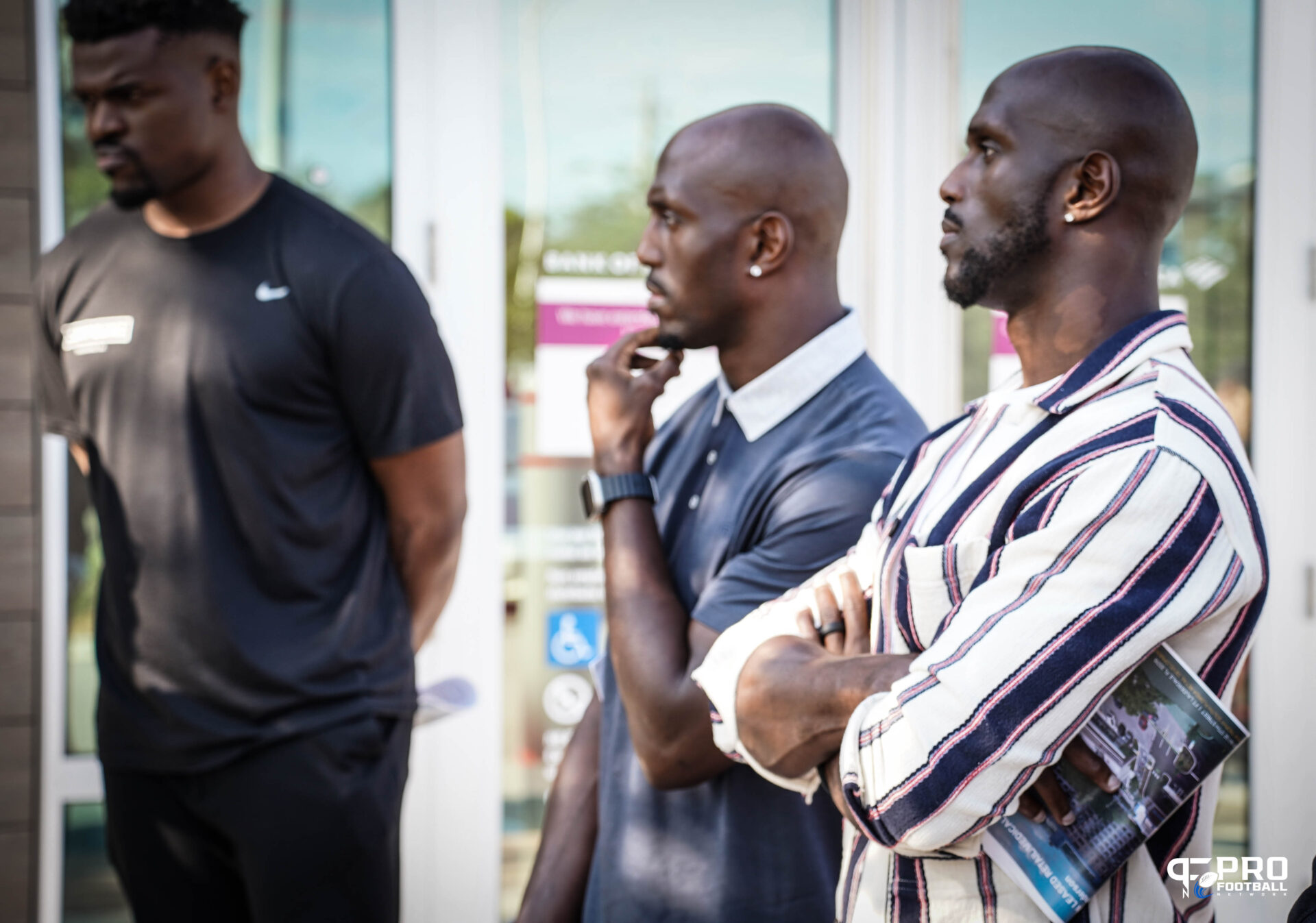Jason McCourty and twin brother Devin McCourty have long competed on the field for recognition and accolades as defensive backs. Now, they may now compete for attention on television screens. Jason just finished his first season hosting Good Morning Football alongside hosts Jamie Erdahl, Peter Schrager, and Kyle Brandt, while NBC just announced that Devin would be one of the analysts on Football Night in America preceding Sunday Night Football.
That means fans could wake up to one McCourty hosting Good Morning Football on weekdays and finish their weekend with another McCourty providing analysis alongside Maria Taylor, Jason Garrett, Tony Dungy, Chris Simms, and Mike Florio before Sunday Night Football.
For the McCourty brothers, this means entering an entirely different world of competition. The rules are poorly defined, the metrics for success are impossible to quickly determine, and their experience as football players only provides marginal advantages, even when talking about football.
Nevertheless, they’ve used that background to the best of their ability – not just in how to talk about the game, but how to prepare about the talking.
Devin McCourty On Retirement: ‘I Don’t Think We’ll Go Win a Super Bowl’
Hanging up his cleats was tough for Devin, but the decision ended up being pretty clear. “It turned out to be pretty simple for me,” he said. “I didn’t feel like I had the same passion I had previously.”
Devin’s shoulder injury turned out to provide a moment of reflection, too. “Having a shoulder surgery,” he said. “I kind of took that as a time to figure it out. So at the end of the season, I was pretty sure I was done. During my rehab, when it’s time to start working out again, let me see how I feel.
“A good friend of mine, Matt Slater, is in there working out as I’m rehabbing so I’m like, ‘alright.’ And I forgot what day it was, I was like, ‘These next two days, I’m gonna go in here and workout.’ And I’m in there working out and like, I’m now thinking, ‘I’m doing kind of an old man workout.’ And I’m watching him, and I’m seeing a difference between the way he’s working out and the way I’m working now,” said McCourty.
“I kind of knew from right there it was probably it. I then went on vacation and just being with my family, I knew I didn’t want to do that anymore. And I knew some of the things I wanted to pursue, going on TV, doing those things, felt more important than going and playing football at the time.
“From there, it was actually making the tough decision of now publicly saying, ‘I’m done’ and telling Coach (Bill) Belichick, telling Mr. (Robert) Kraft — ‘oh like, now this is real,’ like I already thought about in my mind. I told my wife, but it was like, ‘once I tell other people, this is actually real.’ And once I kind of came to grips with that, I felt pretty good about the decision.”
There was a little bit of wavering from McCourty on the decision to retire, but refocusing on his priorities made the choice a little bit easier. “I think for me to back-and-forth was just a little bit of that fear of not doing it. I started to just think about the things that were enticing [reasons] to play were no longer the things that I used to care about. Contract career earnings, interceptions, those things were things I never cared about. I didn’t start for the Patriots to do those things,” he said.
“But I think especially as you get older, you start to only play to win a Super Bowl. And I was like, if I go back, I don’t think we’ll go win a Super Bowl,” McCourty said. “So as I started to sit there and be like, alright, ‘what did we really set myself up for? We were eight and nine last year? Am I gonna go to another team? Is it worth it for six months?’”
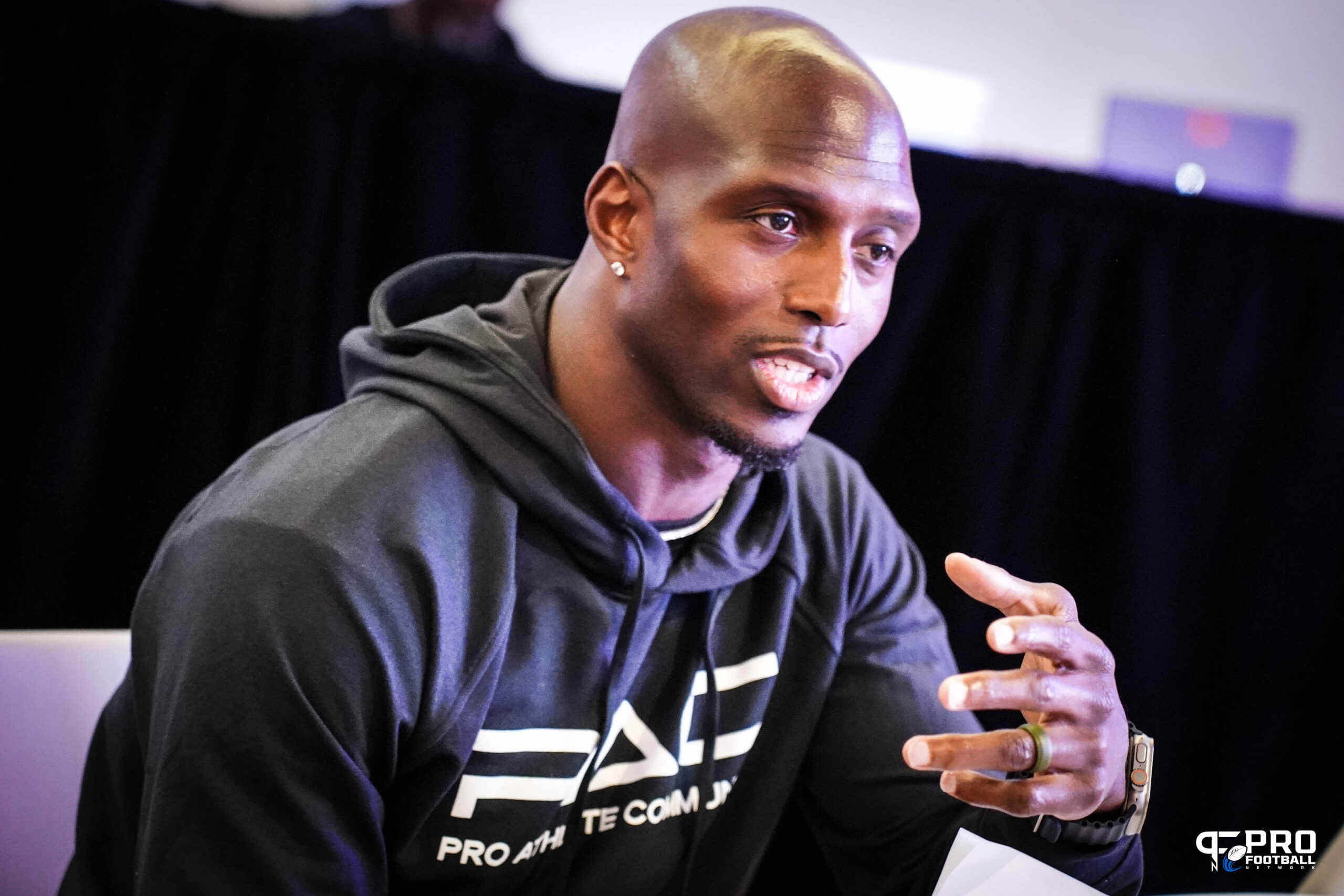
Jason McCourty Finds Comfort in Discomfort
They want the post-NFL process to be uncomfortable. As Jason McCourty told veterans during this year’s Pro Athlete Community Business Combine — an event designed to prepare players for their post-NFL careers — leadership and change requires people to be uncomfortable with being comfortable.
“I’m at the house with my wife and our three kids,” he said in a presentation to other players. “And I said to my wife, ‘This upcoming year, something I want to challenge myself with is being comfortable being uncomfortable.’ And it was something I heard when I was in college, our coach always used to say, ‘Leadership: you have to be comfortable being uncomfortable.’”
He continued, “It was something that I’ve always said since then, and my wife challenges me, she looks at me, and she was like, ‘Well, what are you really uncomfortable? What are you doing that’s really making you uncomfortable? Because at this point, you’ve gone through the same routine, you’ve played football year-in and year-out in the offseason, you’re training, you may do some speaking things, but you’re not really doing anything that is making you uncomfortable.’”
That challenge from his wife invigorated McCourty to expand his media portfolio and his post-career options — something it turns out he needed to do after sustaining a Lisfranc injury playing for the Miami Dolphins in his final NFL season.
Jason then attended his first PAC conference, stocked with business leaders and investors, and reveled in his unfamiliarity and discomfort with the worlds of real estate, finance, and business. He knew intellectually that it was important to take advantage of opportunities as they appeared, but the stark difference between the interest generated by a current NFL player and a retired one was enormous.
“Strike while you’re hot,” he said. “You know how many people want to meet you, hang out with you, ask you questions? Ask you how you scored that touchdown, got two sacks, whatever the case may be?”
Turning that interest into opportunity was vital, so McCourty leveraged his experience in media — a relatively small portfolio but much larger than most NFL players — into a career. He hosted a radio show in Tennessee and would sometimes, along with safety George Wilson, would interview players throughout the week, primarily for fun.
Later, when McCourty joined the New England Patriots in 2018, he and Devin started a podcast together called Double Coverage. This took advantage of the fact that they had natural chemistry and played for the same team. It was initially a way to insert player voices into the football conversation, but it turned into something that could set the McCourtys up for work after the NFL.
Though the first few episodes drew respectable numbers — the pilot drew 4,400 views on YouTube and more on podcast platforms — the show would struggle to establish itself in a media space full of player podcasts and football personalities, with many episodes drawing under 200 views on YouTube, with similar drop-offs on other listening platforms.
Nevertheless, it was the kind of experience the McCourtys needed to be comfortable in front of a camera and a microphone. It also gave them time to establish critical skills, like the ability to fill space, interview guests, and speak on a wide-ranging array of topics on and off the field.
Still, they both had a lot to learn. And that’s one reason why Devin joined his brother in attending the Player Athlete Community conference a year later.
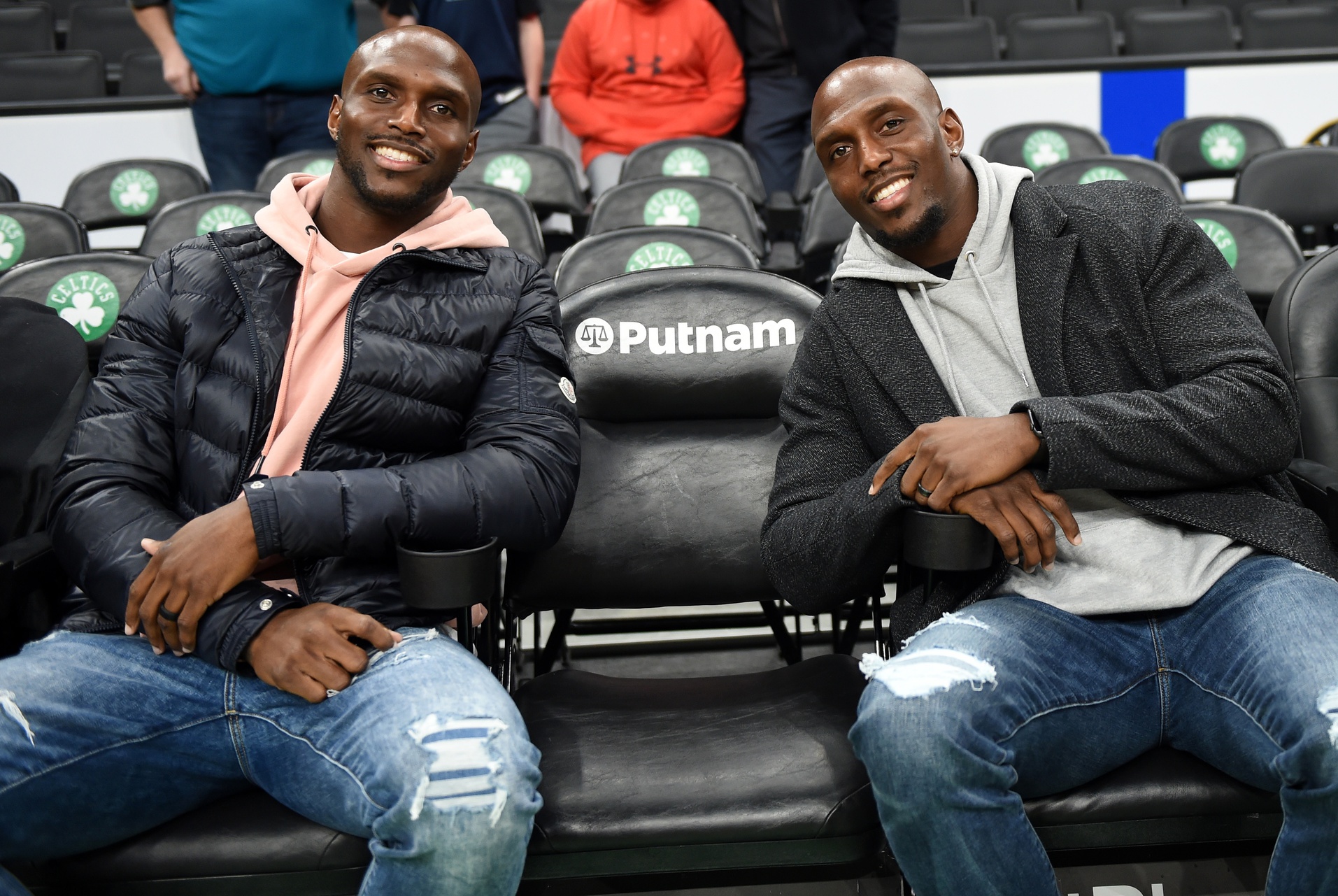
Broadcasting Is a New Battleground for the McCourty Twins
The younger McCourty twin (Jason by 27 minutes) was always charismatic, but that’s never enough in broadcasting. We’ve seen players with magnetic personalities who are comfortable on camera flame out as commentators and analysts. That makes sense; it’s a crowded space and one that demands a different skill set.
Indeed, Devin has often been the more outspoken of the two in locker-room settings. That didn’t matter.
“The crazy thing is, even guys that are really good in the interview process [struggle]. They’re the one being asked a question, and you’re giving me answers and it goes totally different,” Jason said.
It’s hard to test for broadcast acumen, especially as a proactive generator of content. On top of that, players may have deeper knowledge of the game than outside commentators, but they often struggle without access to the resources they typically have during the practice week.
“Now, you’re going on every day as a broadcaster, you don’t have the same insight of sitting in meetings and talking about what just happened, how we’re going to decimate or beat this team.”
As a result, McCourty found himself doing something players typically loathe to do: pay attention to the media. “For me, it’s been a lot of studying. Not only having a charisma and being entertaining and being able to have kinship with the people who are hosting this; a part of going in there and studying and reading what is being said about different players in our league and different stuff.
“I pay so much more attention to just the sports media, of who I follow on Twitter, the things that are going on in the league. I’m actively learning how to get better at while going out there every day.”
Still, McCourty knows what he knows, so he approaches getting better at commentary much like he does getting better at football. “I’m getting reps, which was something I never really thought of,” he said. “I was able to do color commentary and radio. Now when I watch a game, I’m listening to the Troy Aikmans, the Greg Olsens, and I’m listening to how they’re doing their craft. Now, I can name who the play-by-play guys are as I’m doing a game. When I was playing, I never paid attention to any of that stuff.”
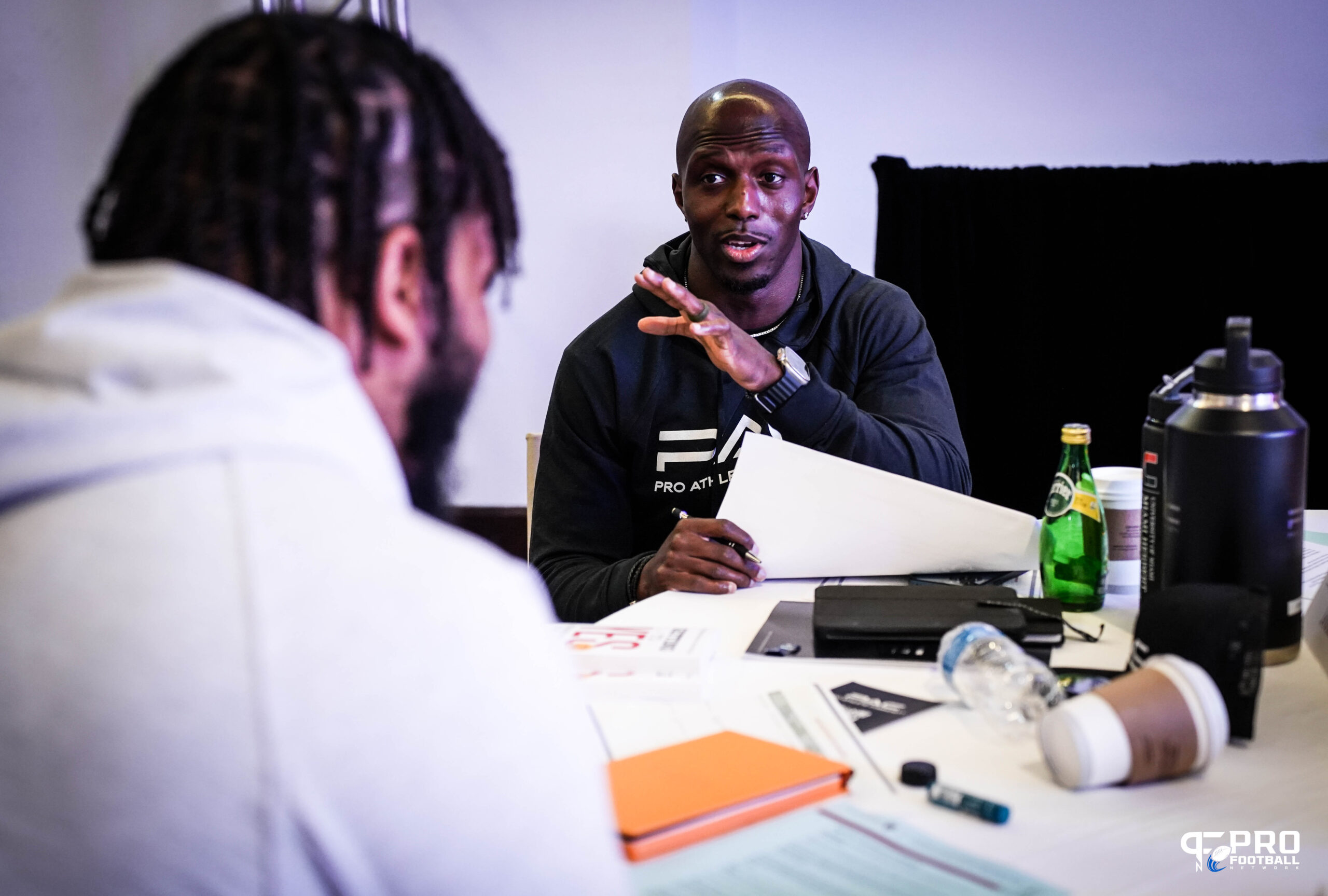
And, like any player studying film, Jason learns from watching the greats. “I’m watching First Take now,” said the former Tennessee Titan. “I don’t really care about what stance they’re taking, I’m listening, and I’m seeing how does Stephen A. [Smith] formulate his arguments and provide content and make it entertaining?”
It was work in a way that McCourty wasn’t completely used to, either. “When someone tells you to watch film or lift weights, you gotta do all that — that’s routine. You don’t think twice about those things. That’s just what you’ve done for so long it doesn’t feel like work.
“Now it’s a totally different bar where it’s just like, if you’re going to read something, you’re studying a player, whatever the case may be in a totally different field, you have to see it the same way. This is going to be what it takes to be successful.
“You always hear people wanting to get into sports, sports broadcasting, and we think, ‘well, I’m gonna retire, and I’m just gonna do this, or I’m just gonna go talk football.’ You think it’s going to be that simple,” he warned. “And I had no idea.”
McCourty struggled with broadcast terminology, camera placement, scripting, movement, and so on. And it was embarrassing to ask, so he had to ask his coaches and mentors. Whether that’s Brandt, who has served on both the production side at the Jim Rome Show and as on-air talent, or the production crew that provides immediate feedback on what he needs to do better.
“It burns you, and now you look like an idiot,” he said. “So that was a tough thing early on, finding the producer or the one person that you were able to feel comfortable with saying like, ‘Oh, I don’t, I don’t know what this is. I don’t know what that is.’”
He added, “They were obviously very helpful knowing that I was starting out and seeing something in me and saying, ‘Hey, we think he’s really good, but we’re gonna have to help or make sure he’s go for certain things.’ So early on, that was, that was tough. It was just figuring it out and being honest. I don’t know what I don’t know.
“I’m around people with over a decade-plus of experience in this area,” said McCourty. The difference that kind of experience brings is stark. When he and Devin had a podcast together, they would often run down the content they wanted to cover before the show or the questions they wanted to ask a guest. But the type of back-and-forth that conversations are expected to elicit or the resonance certain topics have with an audience is knowledge borne of experience.
“Learning [that] difference is invaluable because you come as a football player, you have no idea,” he said. “Can you talk sports? Of course — bring up any player in the league, any position, I can talk about them. But how do I know how to provide the content that you want to listen to? Because I’ve always been the content, me just being there as a current player. And now, when you’re broadcasting, we don’t have that same pull.”
Knowing Too Much Football Is an Issue Too
Both McCourtys have had to tune their experience to the realities of broadcast television, but they have experience with that as well. When their podcast was picked up by a local television station, they shortened the freeform program from 45 minutes to 22 with tight timings.
It meant that they needed to pick and choose which concepts to explain, especially in a game-day broadcast booth. The defense may have run an interesting coverage while the offense executed a brilliant play, but there’s only time to talk about one, and there has to be efficient word choice on top of it.
“Can I explain something in a 30-second soundbite in layman’s terms about play-action passes that my mom sitting on the couch at home can understand? And that’s the beauty of it,” Jason said. They’ve been learning football and football terminology for two decades. They might be able to intuitively understand what the Cover 3 Mable/Skate rules are for a trey set from the offense, but that won’t be the language they use on air.
So, the challenge is to understand the game from the viewpoint of an average home audience member and bridge that gap. The McCourtys might be able to pick one term and define it, or they might be able to explain the concepts while dropping the jargon. But they have to know that they’re doing it and that transition can be difficult.
It’s a lot of work, but it’s rewarding. Devin pointed out that it’s possible to have fun in his second career. “You can have fun in retirement! Which, when I first got into the NFL, I remember meeting guys that were retired. And the first thing they would tell me is, ‘Play as long as you can.’ Like you can’t make money out here once you’re done. And I think that kind of creates that fear.”
The McCourtys Had To Rethink Media
Of course, the two had to reframe their relationship to the media, now full of colleagues instead of adversaries. “[I remember being] posted up in front of the meeting room, saying ‘beware of the media, they are not our friends, they are our enemies — you don’t have personal relationships with the media,’” said Jason.
McCourty realized that this oppositional relationship wasn’t real, but it did stem from something grounded — the incentives of a coach and those of a reporter are completely different. In many cases, the coach doesn’t want the full truth out there, whether it involves a schematic tendency, a new game plan, or a player injury. Information is a weapon.
Reporters, on the other hand, want as much context as possible when reporting and understand what plays with their audience. Knowing which players are going to start, who the focus of the game plan might be, or who might be struggling because of a nagging injury can be important to the fan tuning into the pregame show.
Coaches, however, according to McCourty, understand when and how to maximize their media relationships. “They understand when they’re talking how to get whatever message they need to get out. It could be something as simple as on Kyle Pitts’ coaches in Atlanta saying, ‘His numbers are down this year, but he’s blocking better,’” he said.
“So now, when I reach out to him as a member of the media, I talk to him about how well he’s blocking,” he said. “Now I go on the show, and I’m like, ‘Hey, I know you guys out fantasy players are pissed off about this, but turn the film on, look how well he’s blocking,’ – have I sat down and dissected the film? No, but just based off of what this coach just saying, I’ve been able to put that information out there.”
McCourty would use his connection with his brother to get some inside information on the Patriots, but he really learned that coaches weren’t completely honest when they told players that the media was their enemy — watching Schrager list off scoop after scoop because of his personal relationships with those coaches was an eye-opening experience, and McCourty regrets sharing that adversarial attitude.
“When you’re in one locker room for eight years, you start to get to know people,” he said. “But not intentionally — reaching out to them, asking about how they’ve gotten into the business, how they became a beat reporter for a local paper, why you went from the beat reporter of the local paper to now you’re showing up in my building as a reporter for the NFL Network. How the hell did you do that?
“The connections that these people have, the platform that they have is huge,” McCourty said. “Sometimes that piece is missing because the person in the front of the room is telling you to beware.”
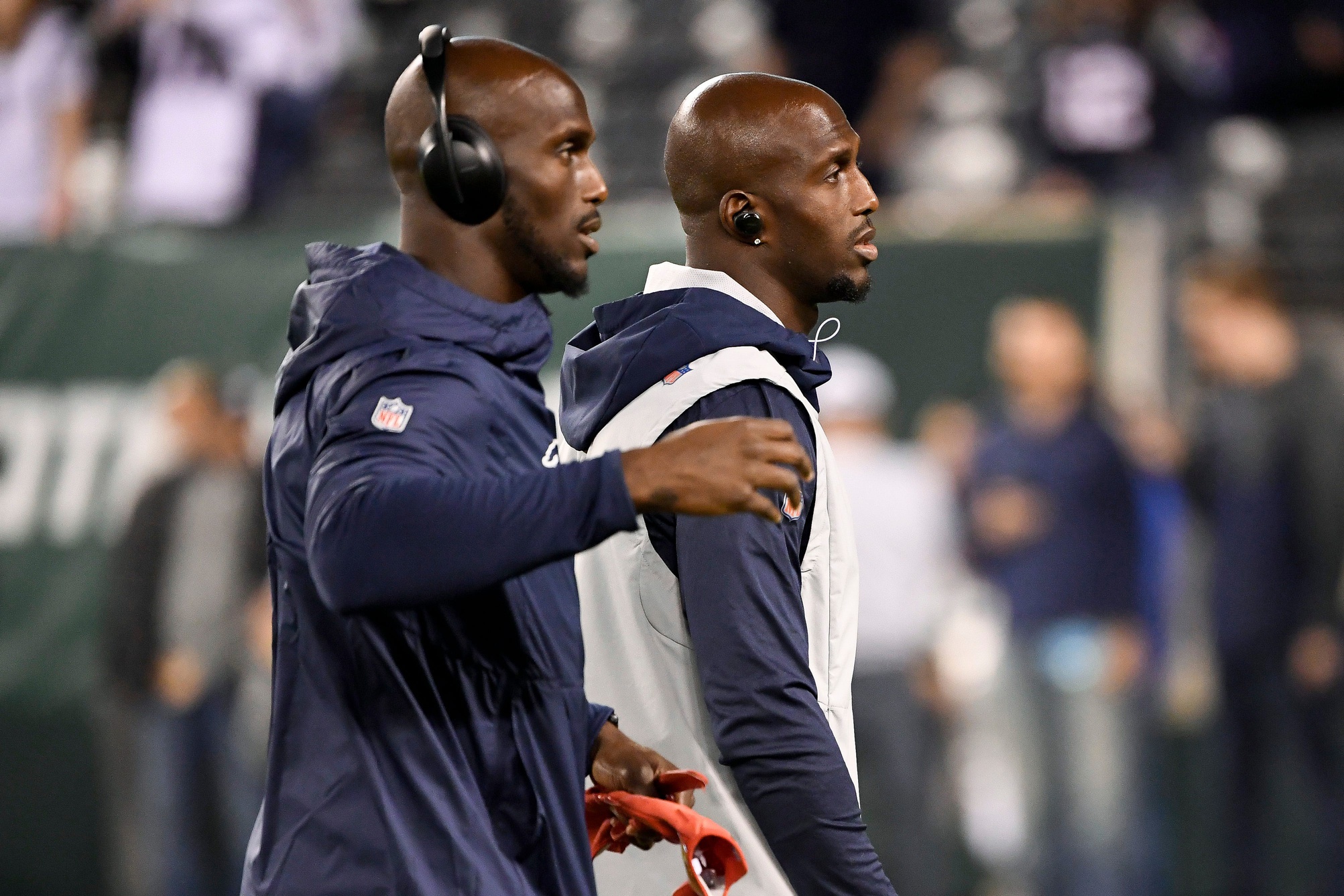
Devin and Jason McCourty Know the Power of Platform
That platform has been on their minds. One of their ultimate goals is to use that platform to support research for the treatment and cure of sickle cell disease through Boston Medical Center. Both McCourty twins have been heavily involved in awareness and fundraising efforts to combat the disease.
In addition to that, both have been involved in efforts to generate more productive outcomes for at-risk youth, with Devin co-writing an opinion piece in the Boston Globe with Robert and Jonathan Kraft to support juvenile justice reform and focus on mental health and community building in justice efforts rather than punitive efforts for young offenders.
As Devin explained, “That’s a part of the reason why I want to do media, because media allows you the access and the name, to still raise money and be a part of different nonprofits. So that’s my ultimate goal — to continue to raise money and awareness for sickle cell and also helping young individuals, young people who have made mistakes, get out and find better opportunities by being successful in life.”
Despite the accolades and on-field success, it might very well be the case that the McCourty twins have a bigger impact after their NFL careers have passed.

